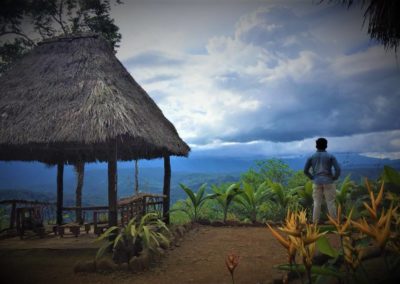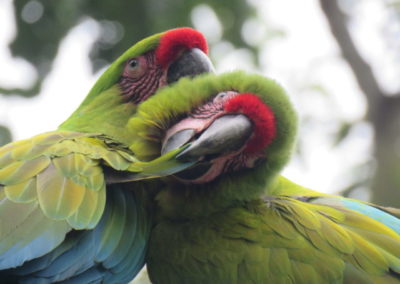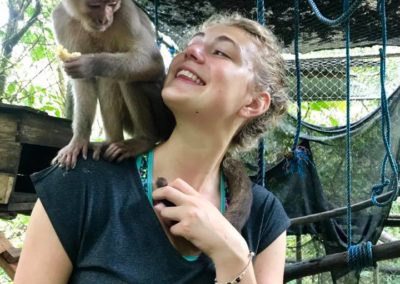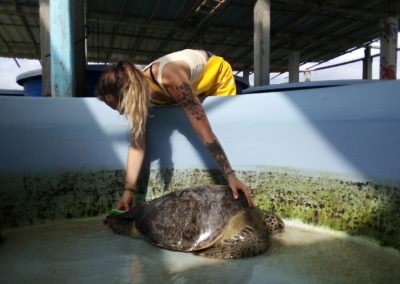PERMACULTURE AND EDIBLE FORESTS PROJECT
Learn how to generate food and take advantage of the benefits of the forest and native plants, learn about ecosystem regeneration and permaculture techniques.
Costs
2 weeks – $1750
1 month – $2300
2 months – $3400
3 months – $4500
Each extra week – $275
Dates
Project available year-round. 1 to 6 months durations available.
The project
The reserve is located at 550 meters above sea level in the heart of the Andean Chocó rainforest, one of the most biodiverse regions in the world. Despite its natural splendor, this area has faced significant threats from intensive cattle ranching, monoculture, metal mining, and other harmful practices over the past 40 years, severely impacting the native ecosystem.
The reserve boasts a regenerating secondary forest, where guests can explore the fascinating stages of ecological succession. It also features pristine springs and streams, perfect for learning about local fish species and a wide variety of aquatic life.
The project has successfully restored 6 to 7 hectares of degraded land, once used as cattle pastures, transforming them into vibrant forest gardens that yield an increasing variety of food each year. Various innovative restoration techniques have been employed, with a special focus on “analog forestry,” aiming to replicate the natural structure and function of the native forest using species that are beneficial for daily life.
Dates/Length
Project available year-round. 1 to 6 months durations available.
Costs
2 weeks – $1750
1 month – $2300
2 months – $3400
3 months – $4500
Each extra week – $275
Location details
The project location is at the cloud forest, 3 hours from Quito.
Requirements
Itinerary Sample
Mondays to Fridays:
7:30 breakfast
8:30 harvesting at the forest
12:40 group lunch cooking
14:00 working at the greenhouse
17:00 activities with the kids of the community (optional)
19:00 dinner
1: No poverty
2: Zero hunger
3: Good health and well-being
4: Quality education
5: Gender equality
6: Clean water and sanitation
7: Affordable and clean energy
8: Decent work and economic growth
9: Industry, innovation and infrastructure
10: Reduced inequalities
11: Sustainable cities and
communities
12: Responsible consumption and
production
13: Climate action
14: Life below water
15: Life on land
16: Peace, justice, and strong institutions
17: Partnerships for the goals
200 native plants were seeded to regenerate the forest
50 square meters of clean and regenerated wetlands
4 different community spaces intervened jointly by the community and volunteers.
- Acquired practical experience in permaculture and ecological restoration.
- Exposition to various educational approaches and environments, enhancing their learning experience.
- Through subjects like forest ecology, soil dynamics, and water management, students acquired practical skills applicable to real-world environmental challenges.
- Engaging in the regeneration of wetlands provided students with practical knowledge of wetland ecosystems and their restoration.
Role of the volunteer
Volunteers will be divided into working groups and will be supervised by a coordinator. Participants will carry out various activities focused on two areas: permaculture, restoration and conservation activities and environmental education activities.
These activities include ecosystem restoration, which includes seed collection, plant production in the nursery and reforestation. They will work on trail maintenance and organic agriculture, which will consist of composting, harvesting and managing a vegetable garden.
They will also collaborate with the school forest project, an environmental education project for all ages, which focuses on bringing people closer to nature and creating conditions for them to develop curiosity and motivation for knowledge.
Skills required
No special experience is required. However, the number one qualification is the willingness to learn and help, as well as being opened to live in a small community and be part of their daily activities.
If you want to know more about the project objectives, working areas, requirements and extra activities around
What’s Included?
Accomodation
Available during the length of the project (At shared rooms/cabins at the project, it includes 2 meals per day)
Transfer from Quito to project
Aiport pick-up and drop-off
EcuaExplora staff ready to transport you
Support 24 hours
On the ground EcuaExplora staff available
First weekend accomodation
In a hostal or host family in Quito, includes breakfast
Orientation
(includes city tour and lunch)
Not Included
Health insurance (REQUIRED)
Meals not specified
Transportation to/from the homestay to the project each day
Optional extras
- Add $60 per week for 6 hours Spanish classes if in Quito.
- Optional 1 day excursion at the first weekend




